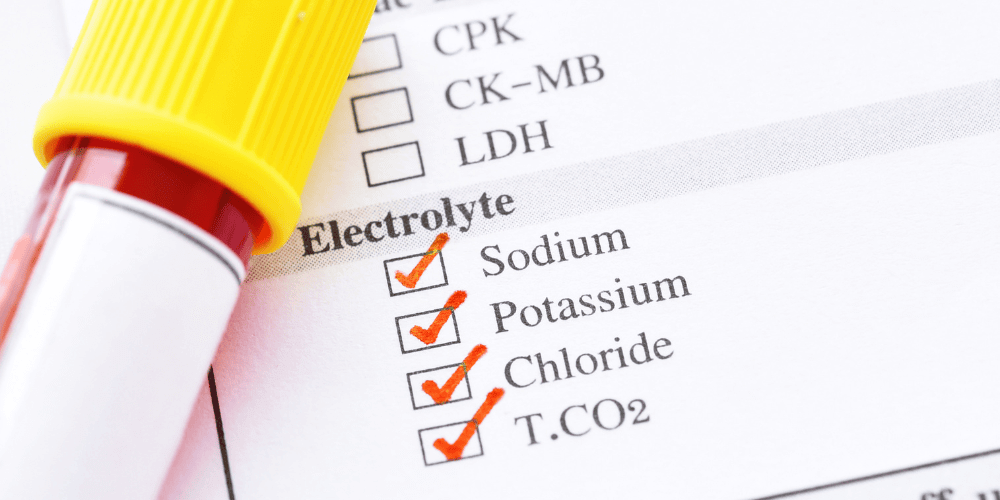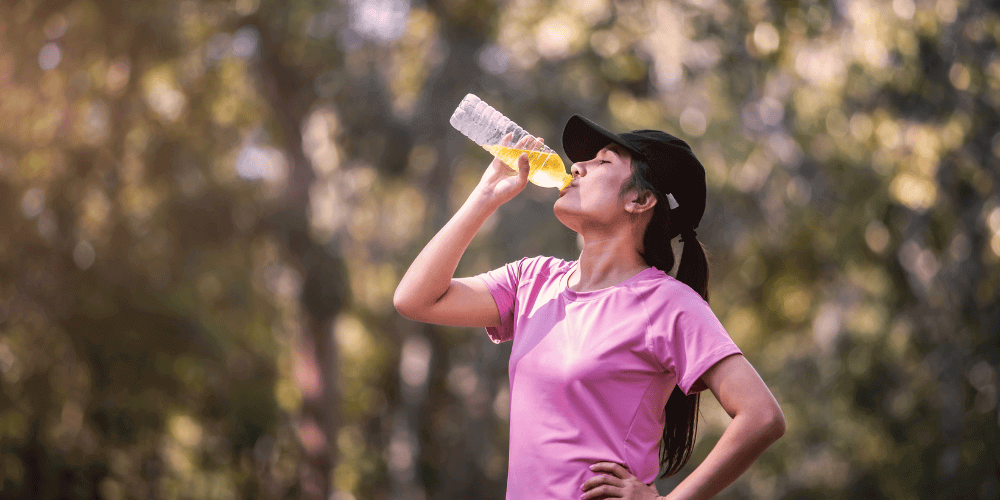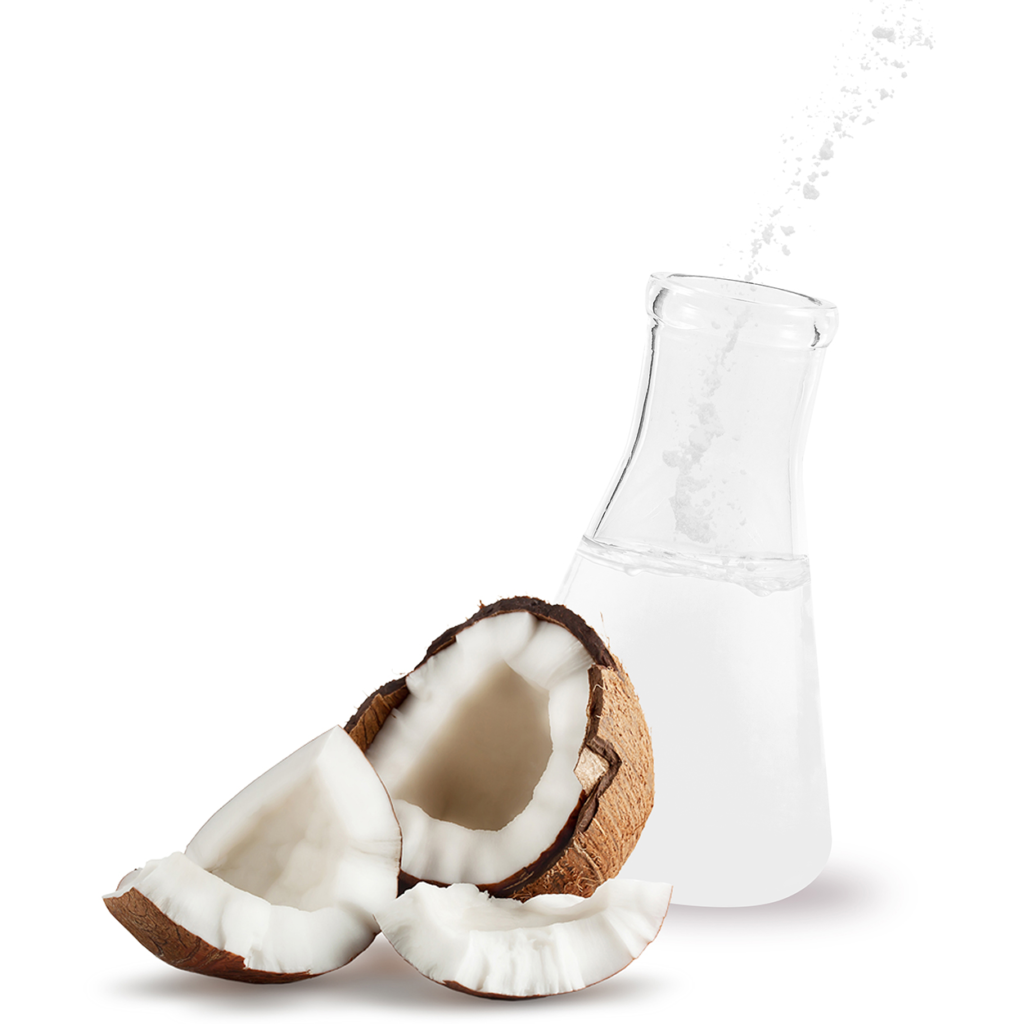Global leader in natural ingredients, Nexira shares how electrolytes help maintain physical and cognitive performance, as well as major body functions like protein synthesis. Natural electrolytes from real fruit powders help promote hydration and normal fluid balance.
About 60% of our body weight is water but it may slightly vary between individuals. Body fluids are composed of water and electrolytes. Electrolytes are ions dissolved in water, such as potassium or sodium. Body fluids and electrolytes have essential functions: they carry nutrients and waste in the body, and they are important for the regulation of body temperature and for regulating blood volume and blood pressure.
Water balance is essential to stay hydrated and maintain normal body metabolism. The recommendations for water intake, including food intake which represents approximately 20%, are 3.7L per day for men and 2.7L per day for women. These recommendations increase with physical activity and high temperatures that parallel water losses by sweating. (Kenefick et Cheuvront, 2012) Sweating can be up to 2-3 litres per hour. The consumption of diuretics can also lead to hypohydration or dehydration. (Shirreffs, 2009) However, dehydration of only 2% body weight might decrease both physical and mental capacity, while you could notice no clinical symptoms. (Dubnov-Raz et al., 2011) A dehydration of 5-7% body weight may lead to dyspnea, headaches, dizziness, and apathy. Maintaining water and electrolyte balance is also important to preserve cognitive performance. (Latzka et Montain, 1999)
Electrolytes are involved in acid-base balance as well. They play a role in regulating the concentrations of acids and bases in the blood and preventing a radical change in fluid pH, to maintain a normal pH.
Sodium and Potassium are both electrolytes. Sodium is the primary cation (positive ion) of extracellular fluid, and potassium, of intracellular fluid. Complex mechanisms of balance regulate the volume of both extracellular and intracellular fluid compartments. (National Research Council (US) Committee on Diet and Health, 1989)

Potassium activates various cell and nerve functions: it helps maintain intracellular fluids, contract muscle contraction, and maintain normal blood pressure. Potassium regulates the heartbeat and is essential to synthesize protein and metabolize carbohydrates. (Harvard Medical School, 2019) The mineral may also promote bone health by preventing the loss of calcium in the urine. The recommendations for women are 2600mg per day, and 3400mg per day for men. The daily needs of potassium are higher than those of sodium. However, in the current typical U.S. diet, sodium is way more consumed (3300mg/day) than potassium (2900mg/day). (Harvard School of Public Health, 2019)
Evidence suggests that dehydration induced by exercising can have a negative impact on exercise performance. When exercising for a long time, the body will endure carbohydrate depletion, an increase in body temperature and a decrease in the circulating fluid volume that may more quickly cause fatigue. Indeed, exercising commonly leads to moderate hypohydration due to the loss of sweat. Studies proved that hypohydration may attenuate strength, power, high-intensity endurance (Judelson et al., 2007) and endurance exercise performance (Cheuvront et al., 2003). These effects can be explained by the reduction of total body water and the alteration of muscle function.

The restoration of fluid balance and muscle glycogen after exercise is essential. Rehydration is done by consuming a greater volume of fluid and quantity of sodium than the losses (Shirreffs et al., 2004). Indeed, water balance will only be effectively restored when electrolytes lost in sweat are replaced (Shirreffs et Maughan, 1998). Sports drinks can play both roles thanks to their rich content of carbohydrates and electrolytes. Studies also show that drinking during exercise can improve performance, and cold drinks may positively influence body temperature and improve exercise capacity (Lee et Shirreffs, 2007).
Electrolytes can naturally be found in many fruits and vegetables. For example, potassium is widely available in leafy greens, beans, nuts and dairy products. (Harvard School of Public Health, 2019)
For either intense physical activity or endurance practice, sports drinks are recommended. They are mostly composed of water, simple carbohydrates, and electrolytes, the main one being sodium. Their high sugar content provides easily and quickly usable energy for the body. Adding electrolytes to water or other liquid make the drink more effective in improving performance. (Hamilton, 2013) Indeed, glucose and sodium transport are coupled in the small intestine: glucose accelerates the absorption of water and solute, and sodium stimulates sugar and water uptake. Consuming sports drinks can promote the retention of fluid by the kidneys and help maintain normal extracellular and intracellular fluid volume. (Shirreffs, 2009)
An Innova Category Survey reveals that 59% of consumers globally say that they consume sports & functional drinks at least once a week in 2023. Also, 32% of consumers globally desire electrolytes in their sports nutrition products. The North American region is the most active in New Product Launches, and 1 in 2 consumers in the US and Canada use sports nutrition products with electrolytes.
Moreover, the electrolyte claims products market grew by +11% annually in the 2018-2022 period. Sports Powders keeps the lead in the New Product Launches, followed by Sports Drinks Ready-To-Drink and Vitamins-Minerals. Potassium ingredient group leads the product launches and is the fastest-growing ingredient with a +15% in 2022.
Adding electrolytes in sports drinks can be achieved by mixing natural ingredient powders to. For centuries, Coconut palm trees have been grown and used as a source of hydration in tropical countries. Coconut water powder is gaining interest in beverages like pre-workout drinks, juices and smoothies. Why? Its rich electrolyte content, such as potassium, promotes hydration and good performance during physical activity and all day.

Our Wavy coconut powder is sourced from Brazil. The coconut water is carefully freeze-dried to preserve its nutrients and delicious taste in a powder form. This highly soluble powder can be easily rehydrated by adding plain water or another liquid to the mix. Our coconut water powder brings freshness and electrolytes to your tasty beverages and is perfect for drink mix applications, sports drinks and keto/paleo-friendly shakes. Staying well-hydrated has many potential benefits: it helps keep skin clear and may help improve mental focus and energy levels.
As we explained in this article, natural ingredient powders are an interesting solution to maintain electrolytes and fluid balance during or after physical activity. Integrating specific natural ingredients may help improve mental focus and physical performanceof the body. Nexira developed these products as part of POW(D)ER from Mother Nature, an innovative range of powerful ingredients. The nutrient-dense range of powders from Nexira is 100% natural and minimally processed.
Join Nexira on this sensory journey encompassing taste, texture, and color – and start creating nutrition that is evolutive with market trends, harnessing the powerful forces of nature in recognizable superfoods – in a whole new way!
Harvard Medical School., 2019. The importance of potassium In Harvard Health [en ligne]. Date de consultation : 22/11/2023. Disponible sur : <https://www.health.harvard.edu/staying-healthy/the-importance-of-potassium>
Harvard School of Public Health., 2019. Potassium In The Nutrition Source [en ligne]. Date de consultation : 22/11/2023. Disponible sur : <https://www.hsph.harvard.edu/nutritionsource/potassium/>